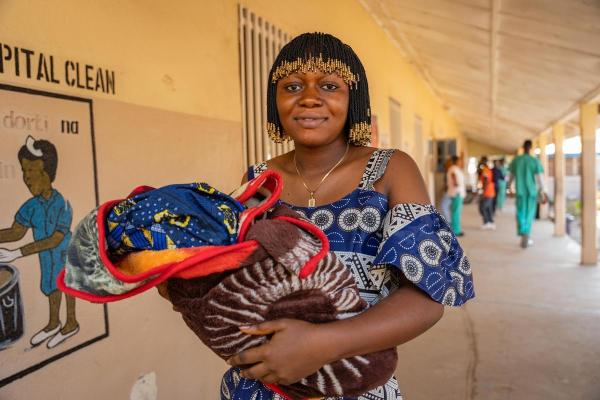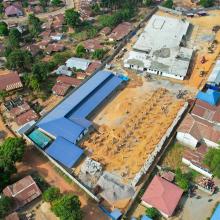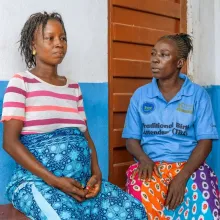When Adama Bangura, a first-time mother, arrived at Koidu Government Hospital (KGH) in remote Kono district to give birth, she was alarmed to learn that her baby wasn’t breathing properly. Thanks to the Janitri technology, which measures the fetal heartbeat in real time during labor, the midwives were able to intervene quickly and made sure Adama delivered a healthy baby.
In Kono, much like other rural areas, the journey to motherhood can be risky. For many women living in rural communities, reaching essential prenatal, childbirth, and postnatal care is a struggle. Geographic isolation, shortages of medical staff, and gaps in technology all contribute to higher rates of maternal and infant mortality. Sierra Leone once had one of the highest maternal mortality rates in the world – an injustice the Ministry of Health and Partners In Health Sierra Leone (PIH-SL) are working tirelessly to address.
A Game-Changer for Maternal Care
Rural hospitals like KGH are crucial in delivering maternal care to communities that would otherwise face significant barriers. An exciting advancement at KGH is the introduction of the Janitri technology, a simple yet powerful fetal monitoring device. Janitri allows clinicians to closely track both fetal and maternal heart rates in real time during labor, helping to identify complications before they become life-threatening.
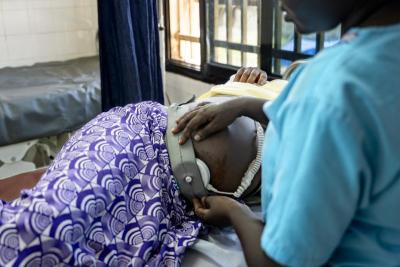
The Janitri device allows clinicians to closely track both fetal and maternal heart rates in real time during labor, helping to identify complications before they become life-threatening.
AbuBakarr Tappiah Sesay / PIH
Midwife Magdalene Edgar King has witnessed firsthand the difference Janitri can make. She recalls a recent case: “A patient was referred from a peripheral health unit, already six centimeters dilated and experiencing prolonged labor. We connected her to Janitri and the fetal heart rate appeared normal, but as monitoring continued, we noticed an increase in the heart rate. We administered oxygen and IV fluids to the mother and reached out to the on-call clinician. The patient was taken to the theatre, where she delivered successfully.” Without the device, the team might not have been able to intervene on time.
Janitri also has an early warning system that helps clinicians assess certain risks such as postpartum hemorrhage. King explains, “Our main goal is to ensure that no one dies, early detection is early intervention. We say in Krio, ‘no belle woman no for die’ (No pregnant woman should die).”
Empowering Clinicians, Reassuring Mothers
Janitri doesn’t just save lives, it also makes the work of midwives and clinicians more manageable. “The workload is heavy. Sometimes I have to monitor up to six women at once,” King explains. “I can connect some of them to Janitri, and while it records their data, I can attend to another patient. It really helps with multitasking.”
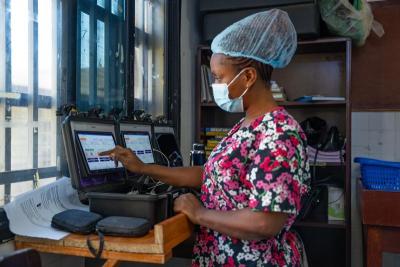
Midwife Magdalene Edgar King uses the Janitri technology at Koidu Government Hospital in Kono district.
AbuBakarr Tappiah Sesay / PIH
Patients like Adama, too, are noticing the benefits. She shared her gratitude: “I’m grateful to the midwives for taking such good care of me and my baby. With the device, they were able to tell me that my baby wasn’t breathing properly. They took immediate action, and I was able to deliver my baby without needing a C-Section.”
News about Janitri has travelled beyond Kono district. The maternity ward is full of women who have heard about the device and want to use it,” says Alfred Kanu, the Janitri project coordinator.
Expanding Reach and Impact
The impact of Janitri is expanding beyond KGH, reaching three vital peripheral health units (PHUs) across Kono: Wellbody Clinic, Sewafe, and Kombayendeh Community Health Centers. Additionally, it has extended to one clinic in Kailahun district, Jojoima Community Health Center, bringing life-saving maternal care closer to more communities. Regular training sessions are held for clinicians to familiarize them with Janitri’s tools, functions, and usage. “The training was interactive, and we were able to ask questions,” King adds.
Since its introduction in October 2023, Janitri was used monitored over 1,100 deliveries and its alerts have led to timely interventions. Over 140 women have been referred from PHUs to KGH thanks to Janitri. The most common alerts include high pulse rate, low fetal heart rate, and lack of progress in labor—all critical signals that enable clinicians to act fast.
A Vision for the Future: The Maternal Center of Excellence
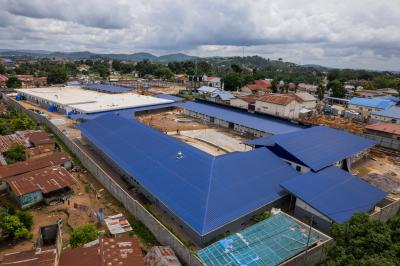
The Maternal Center of Excellence is designed to be a state-of-the-art facility providing comprehensive maternal and newborn health services in Kono district.
Sean Andrew Bangura / PIH
The impact of Janitri is just the beginning. Soon, this technology will be a cornerstone of care at the new Maternal Center of Excellence (MCOE) in Kono, opening to patients in 2026. The MCOE is designed to be a state-of-the-art facility providing comprehensive maternal and newborn health services. Here, Janitri will help set new standards for safe childbirth, combining advanced technology with expert, compassionate care. The center will serve as a beacon of hope for mothers across Sierra Leone, ensuring that every woman, no matter her circumstances, has the chance to experience a safe delivery and every baby has the chance to a healthy start in life.
As King reminds us, the mission is simple but profound: ‘No belle woman no for die.” With Janitri and the Maternal Center of Excellence, PIH-SL is making that vision a reality for the women and newborns of Sierra Leone.
